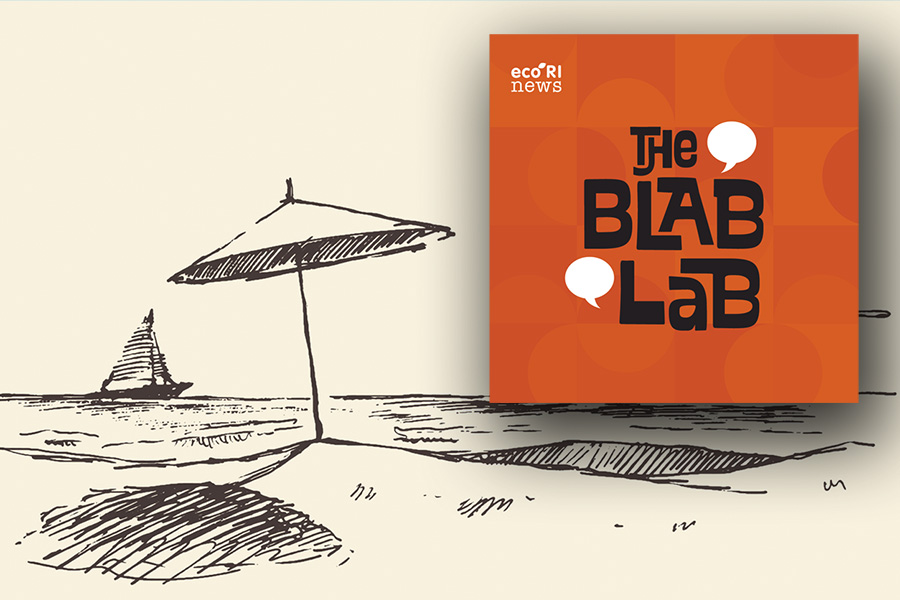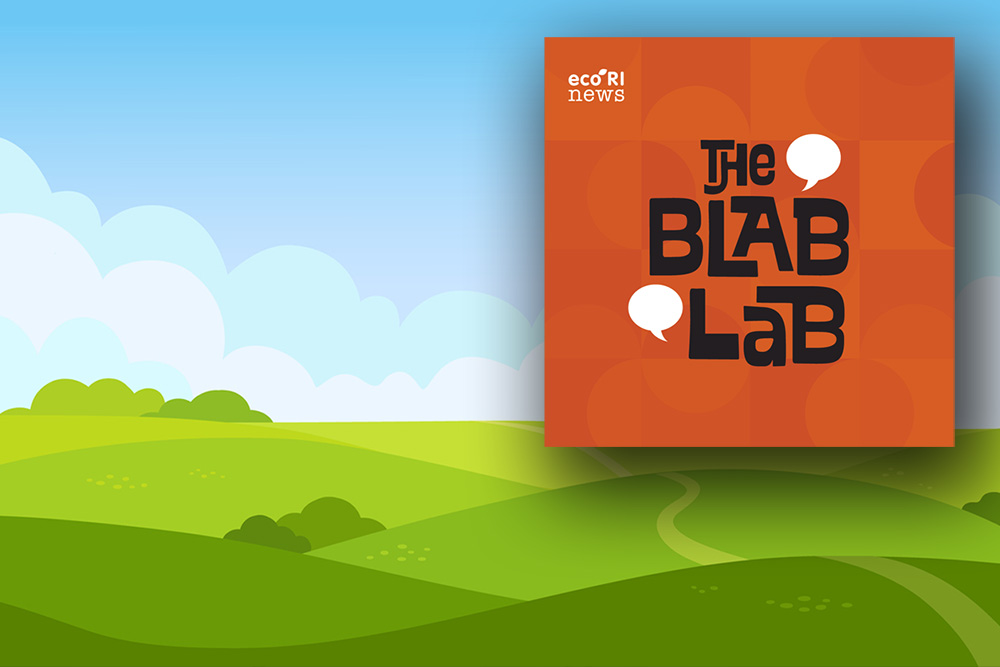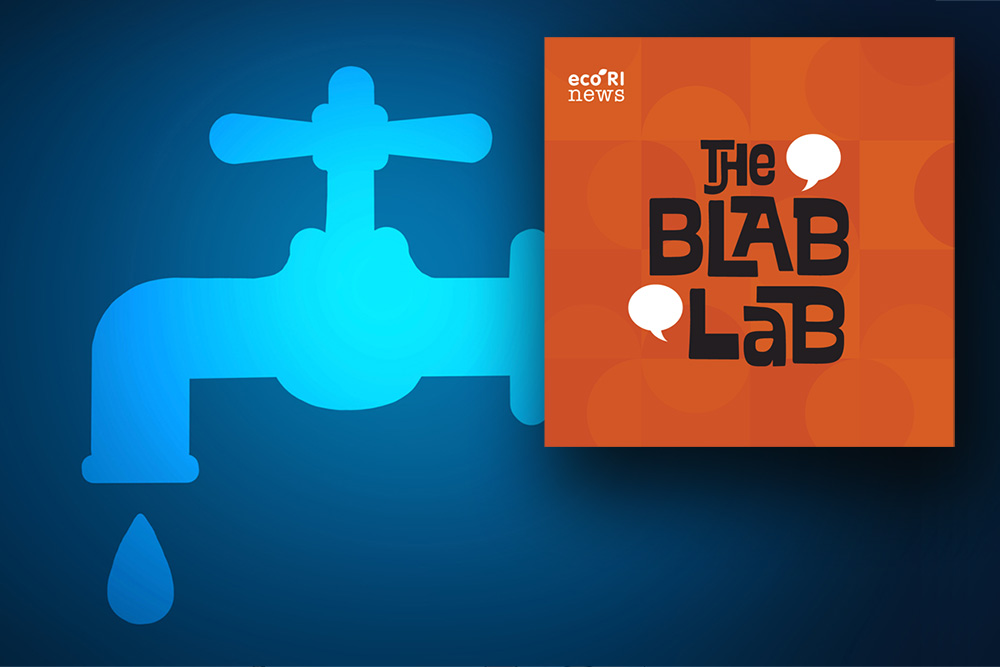Where Have All the Quahogs Gone?
December 14, 2023
ecoRI News reporters Rob Smith and Colleen Cronin examine why quahogs are vanishing from Narragansett Bay. Some shellfishers are saying the bay is “too clean” to support a robust quahog population.
Subscribe and listen on iTunes, Spotify, or wherever you get your podcast.
This transcript was edited for clarity and length.
Colleen Cronin
Welcome to the Blab Lab, a twice-monthly podcast from reporters of ecoRI News where we unpack the critical environmental issues facing southern New England. I’m reporter Colleen Cronin. And today I’m here with my colleague, Rob Smith, to talk about the state of quahogs in the Quahog State.
Hi, Rob.
Rob Smith
Hi, Colleen.
Colleen Cronin
How are you doing today?
Rob Smith
I’m doing pretty good. How are you?
Colleen Cronin
Good. Thanks for coming on the show to talk about bivalves.
Rob Smith
Thanks for having me. Yeah, they’re bivalves.
Colleen Cronin
Before we get started, because I wasn’t sure of the answer to that question, can you tell us what a quahog is?
Rob Smith
It’s just a really fancy name for a clam. They’re also called hard clams. They’re kind of a symbol of Rhode Island. They go in stuffies. They’re usually found in the bay, wild. So they’re sort of just clams and they dig into the ground. But they’re clams and they filter feed and they pump gallons and gallons of water, filtering out their food in the bay every day.
Colleen Cronin
Why are they so important here in Rhode Island?
Rob Smith
We have dozens and dozens of guides who are quahoggers who go out, well just really shellfisherman, who go out and harvest them wild in the bay, like you fish, regular fish, but they use like a bow rake and some other stuff. And then they sell them to wholesalers, who sell them to restaurants, who sell them to people.
Colleen Cronin
All right. So that’s cool to know that it’s not just a fake town, in “Family Guy.” And there’s no town called Quahog?
Rob Smith
There’s no town called Quahog.
Colleen Cronin
OK, good to know. So how are these clams doing these days?
Rob Smith
So we don’t know how the actual clams are doing. But what we do know is that those quahoggers and shellfishermen are catching less than they have been historically. Quahog landings have been on the decline for decades. And there’s a study commission going on right now to investigate why they’re catching less and less quahogs. And if you look at some of the they posted on the General Assembly’s website, you see this long decline stretching from maybe the 1970s to the 1960s to today that they’re just catching less and less. The stat is they caught 900,000 pounds of quahogs last year. And there’s no, really, I don’t know how many trucks that is. But to give you a better idea of how much they’ve declined, maybe 30 years ago, you’d have 1,000 quahoggers, you’d have 1,000 guys or gals out there, up and down Narragansett Bay, working along the shoreline, working in quahog boats, trying to harvest, you know, whatever amount they need to sell to make a living. There was probably 1,000, maybe 20 or 30 years ago. These days, it’s less than 200. I think it’s between 150 and 200 now, and that’s because they’re just not catching enough quahogs to be able to sustain their jobs, basically.
Colleen Cronin
So the title of quahogger is kind of dissipating?
Rob Smith
It seems it does seem to be vanishing. Yeah.
Colleen Cronin
Wow. And what do the fishermen, quahoggers, have to say about this?
Rob Smith
Well, they’re rightly distressed, let’s say, it is their living. Many of them have been doing it for decades. I think Jody King, who’s, he’s a very well-known quahogger based out of Warwick, has said, you know, he doesn’t need to do this job. He’s got multiple master’s degrees. He does it because he really loves it. But it’s not a job he can hand to his son for his son to do or recommend for a young person to do for the next generation of quahoggers because it’s not sustainable, because the numbers are on a slow, steady decline.
Colleen Cronin
And do we have any idea what’s causing the decline?
Rob Smith
The short answer is no. We don’t really have an idea, which I find to be a compelling and invigorating answer, that there’s something we don’t know that’s going on in Narragansett Bay. The short answer is no, we don’t know. We have vague theories. The shell fishermen think the bay’s getting too clean …
Colleen Cronin
Too clean?
Rob Smith
So if you grew up in Rhode Island (Colleen is from the Cape so we will forgive her), if you grew up in Rhode Island of a certain age, if you’re basically a millennial, my age or older, Narragansett Bay was not nice when you were growing up. I grew up in North Kingstown, and I remember the town beach smelling some smells. North Kingstown’s town beach is like right on the bay, sort of above the West Passage. And you know, we were taught by our parents, growing up, “Don’t swim there. It’s kind of gross. The bay is kind of gross. Go to like the south shore or somewhere in Westerly or Charlestown to go swim because the bay is kind of grody and nasty and you can’t swim there.” It’s much cleaner today. Until about 10 or 15 years ago, the bay was overloaded with a lot of nutrients like nitrogen and phosphorus that cause a lot of havoc within the environment. If you live near a, perhaps a freshwater pond that has had a blue green algae bloom in the last couple of years, ‘cause that’s also a problem in freshwater ponds across the state, that’s sort of similar to what was happening to the bay. What happens with those algae blooms is it’s too much nitrogen and nutrients going into our freshwater body. And then that causes negative impacts on all the other living organisms that aren’t algae. In 2003, in Greenwich Bay, which is still not quite as clean as the bay proper, there was a fish kill in 2003 that killed 1 million menhaden from hypoxia, which is a, it’s sort of a state of very low dissolved oxygen in the water. And fish and other organisms do need some oxygen in the water to be able to breathe. And in times when there isn’t a lot of oxygen in the water, organisms will flee if they can, or just die, which is sad. So you had a lot of low oxygen events throughout the Bay when it was overloaded with stuff like nitrogen and phosphorus. And those were primarily coming because we dumped sewage into the bay. So the bay has gotten cleaned from a nitrogen perspective, because the DEM, the Department of Environmental Management, has really cracked down on wastewater treatment plants, cleaning up and treating what gets dumped in the bay. And that’s that was, for a long time, a big source of nitrogen.
Colleen Cronin
So, you know, when I think about the bay being cleaner, I just wrote a story about eelgrass. And how it perhaps is coming back in some areas because the bay is cleaner than it used to be.
Rob Smith
Eelgrass used to go all the way up, deep into the Providence River, up almost where we are, I think, now. Like in colonial times, there are writings of people seeing eelgrass up that far in the bay and today, it’s completely. The environment of the bay in the last 400 years, post-European settlement, is just entirely different.
Colleen Cronin
It’s so interesting. And I guess in my mind, I think about the cleaning as being a good thing. So why are the fishermen hypothesizing that it’s a bad thing?
Rob Smith
So nutrients, like nitrogen, are key food, not for the quahogs or clams, but for the plankton and phytoplankton. Quahogs or hard clams eat phytoplankton as their food source. So if there’s not nitrogen in the water, the phytoplankton isn’t, you know, reproducing enough for the quahogs to eat. And when animals don’t eat, they tend to die off. There’s a couple of data points. There was, we had the 2010 floods in Rhode Island where we had a series of intense rainstorms in 2010. The example I always think of, the Warwick Mall flooded, and a lot of areas of the Pawtuxet River flooded, and some sewer treatment plants flooded. And that went into, untreated sewage, into the bay. And then I think the following summer, I don’t know if it’s summer 2010 or 2011, they saw a pulse or like a small boom in quahog landings because there were more quahogs because there was more nitrogen in certain areas of the bay.
Colleen Cronin
Interesting. So that’s one theory. Are there any other theories out there about what could be doing this?
Rob Smith
It’s not just a Rhode Island problem is the thing. So it would be really nice if it was just a problem of nitrogen and nutrients and the phytoplankton and the quahogs. But it’s not that simple. quahog landings are down, up and down the Eastern seaboard. I know it’s a state symbol. But they’re also found literally everywhere else along these coasts.
Colleen Cronin
Don’t tell Rhode Islanders that.
Rob Smith
In Chesapeake Bay, in many places around the eastern seaboard of the United States are also reporting declining catches and quahogs and other shellfish. And we really don’t know why. There’s a lot of different things that’s happening with the bay, air temperature is getting warmer, water temperatures getting warmer. There’s a lot of different factors that are changing that makes it difficult to point toward one specific factor during this. And that’s why I said at the top, there’s really no easy answers to this, which I think makes it more interesting. But I’m a big ol’ weirdo. But the short answer for that is there’s a lot of different things happening in the bay because of climate change. And almost all of them are probably being caused by climate change. And that may be changing sort of how the bay, and the phytoplankton, the quahogs work in a way we don’t really know or understand just yet. We can’t really pinpoint the one thing, although it would be nice.
Colleen Cronin
So there’s this commission that you talked about, what does the commission hope to accomplish?
Rob Smith
That would probably depend on who you ask on it. There’s, I think, four quahoggers on it. Some legislators, people from the Narragansett Bay Commission, which is, very quickly, sort of like the sewage commission, sort of, and people from DEM and CRMC. And they’re hoping to investigate and find out why. I know the quahoggers definitely want more nitrogen injections in the bay. There’s room for nitrogen injections in the bay, there’s definitely room for that without compromising the water quality in the bay. When you see like a beach closure, it’s not because of too much nitrogen, it’s because of too much fecal coliform, which is what it sounds like.
Colleen Cronin
What do you think comes after the commission?
Rob Smith
I don’t entirely know there’s room for those nitrogen injections. And that’ll help in the short term, but the long term? I don’t know.
Colleen Cronin
So stuffies…
Rob Smith
I don’t know too much about where your stuffies come from. But I would be surprised if it’s just from our Rhode Island shellfishermen.
Colleen Cronin
And here’s the most important question I have to ask. Do you like stuffies?
Rob Smith
No, I don’t like seafood. I don’t like the smell, the taste, the texture. It offends all five of my senses. All seafood, not just stuffies or quahogs or clams. I don’t like fish either.
Colleen Cronin
Well, I can’t agree. But that is what it is. Thank you so much, Rob, for coming on the show today and thank you to our listeners for following along. We want to thank Vanessa Carlton for letting us use her song “Willows” for our theme song, which you hear at the beginning and end of every episode. We also want to thank Jo, who is the publisher of ecoRI and one of our editors on the podcast editing and mixing the episode and fixing all of my editing mistakes. If you have any questions, tips or podcast ideas, email me at [email protected]. And until next time, if you want to read more Rhody environmental news, you can visit our website: ecori.org.
Categories
Join the Discussion
View CommentsYour support keeps our reporters on the environmental beat.
Reader support is at the core of our nonprofit news model. Together, we can keep the environment in the headlines.
We use cookies to improve your experience and deliver personalized content. View Cookie Settings



